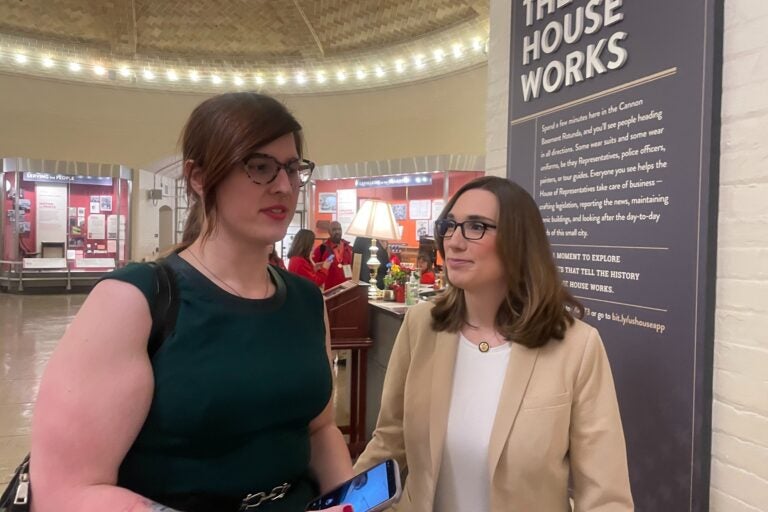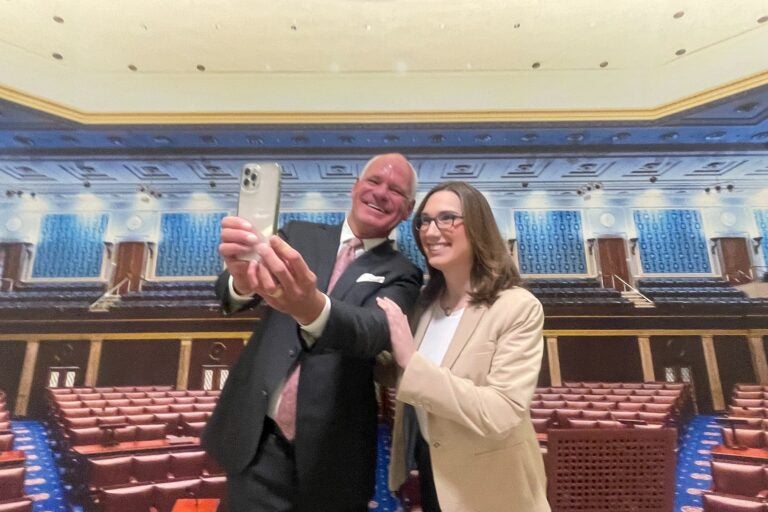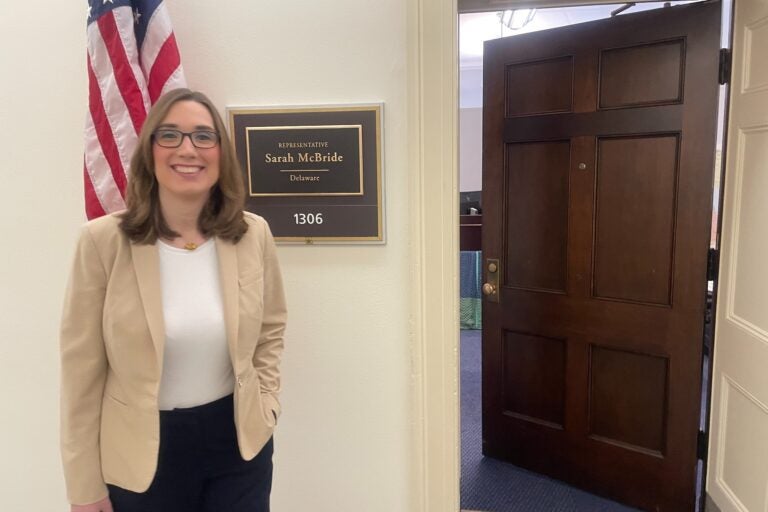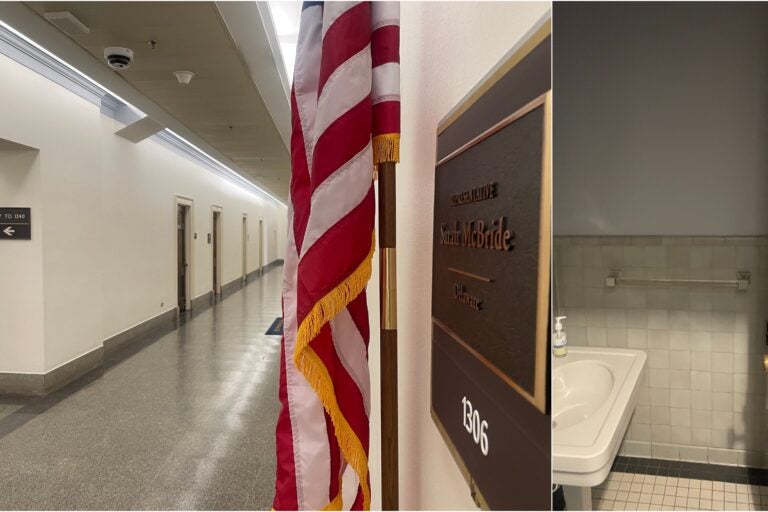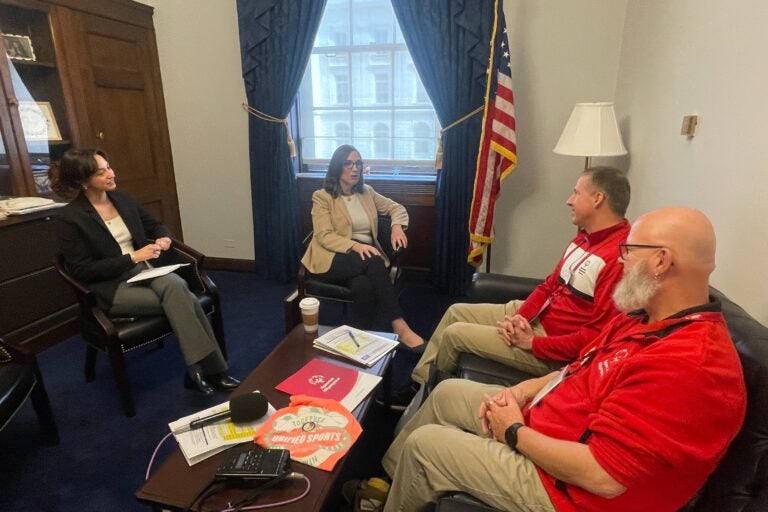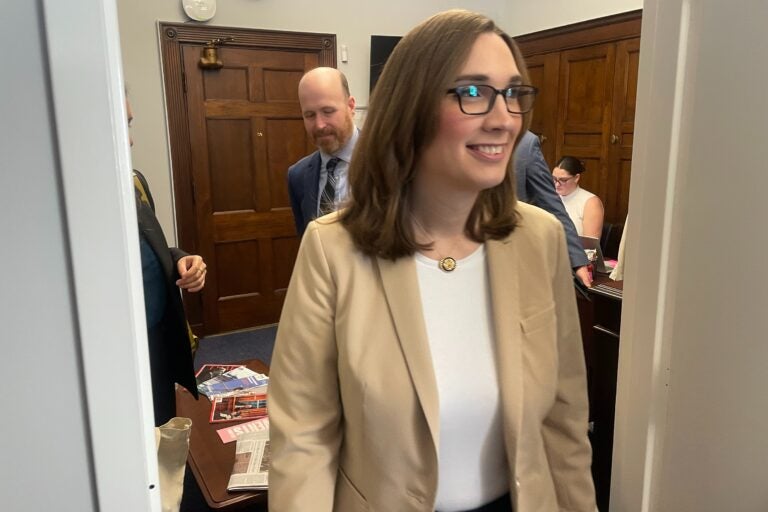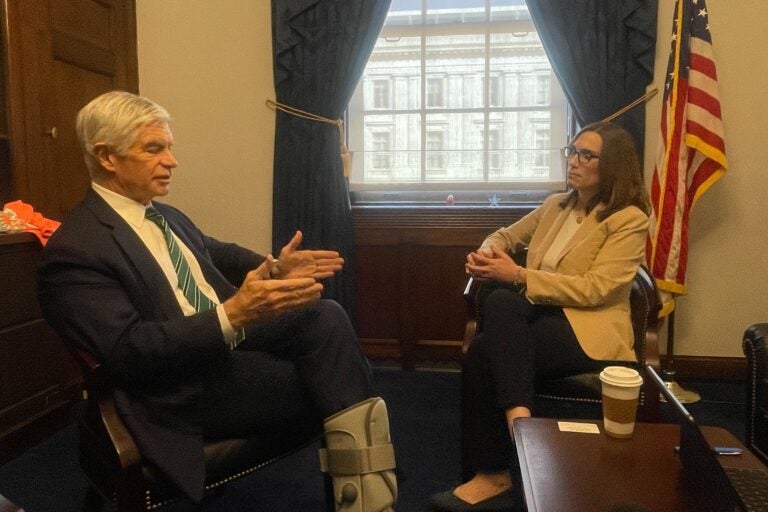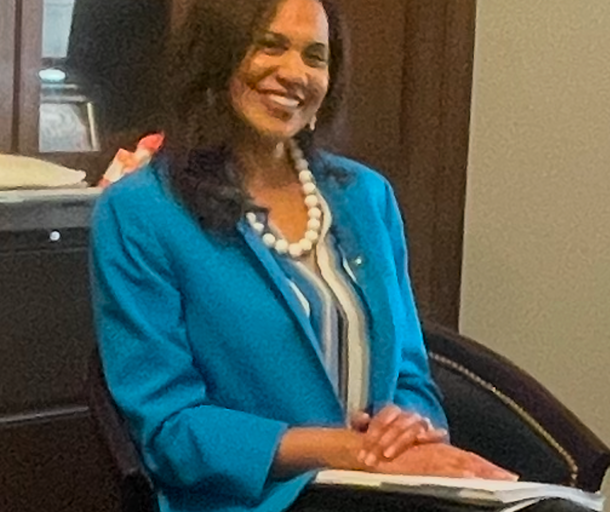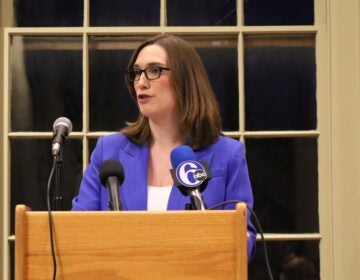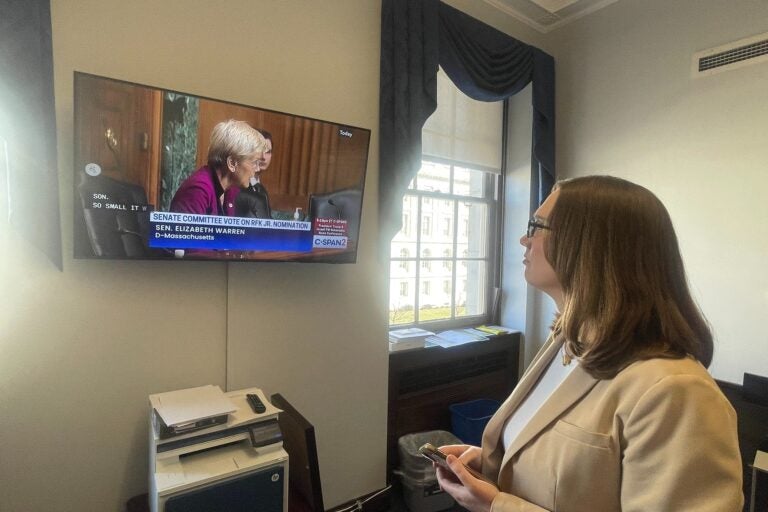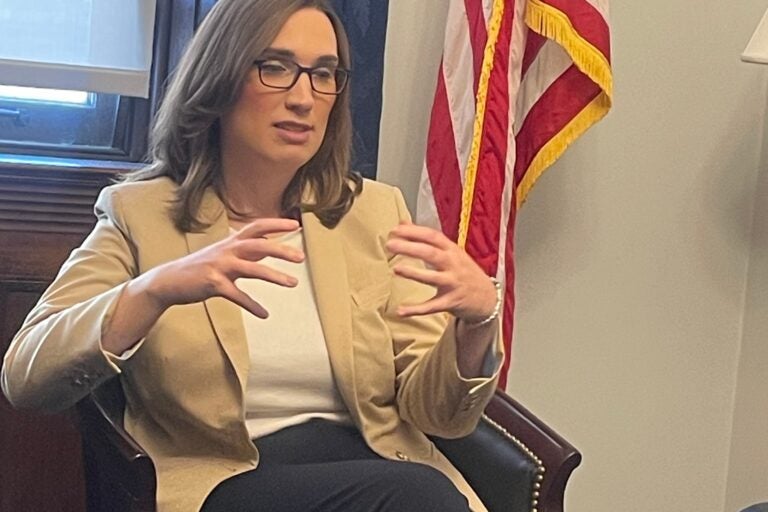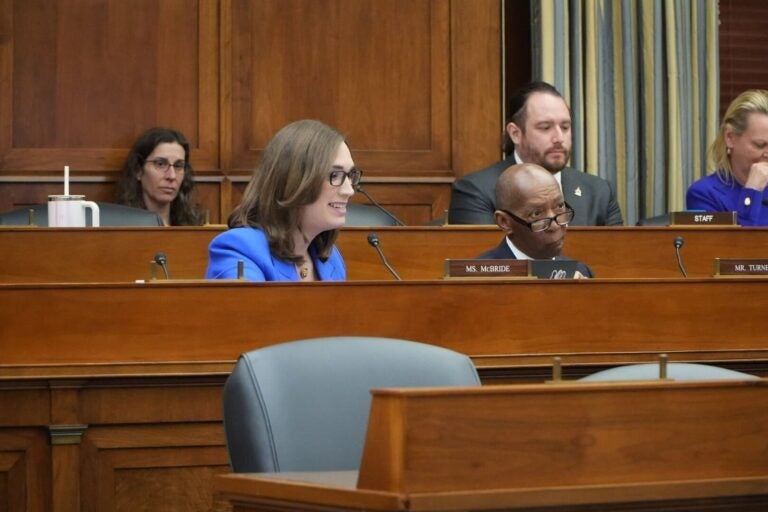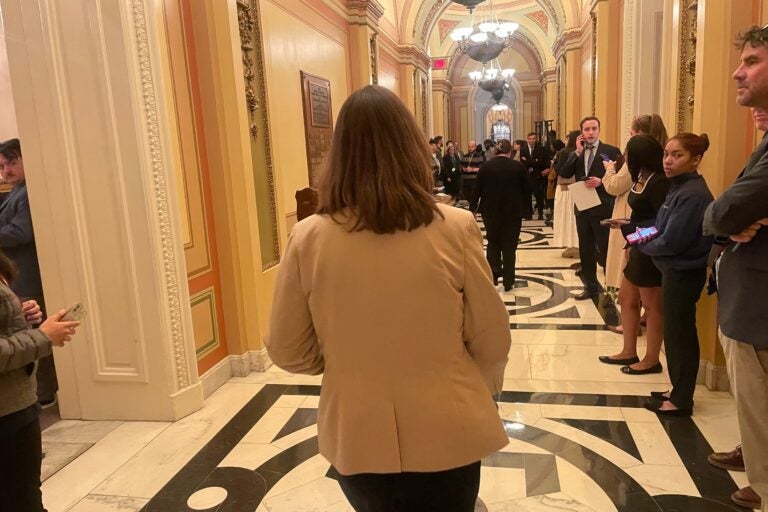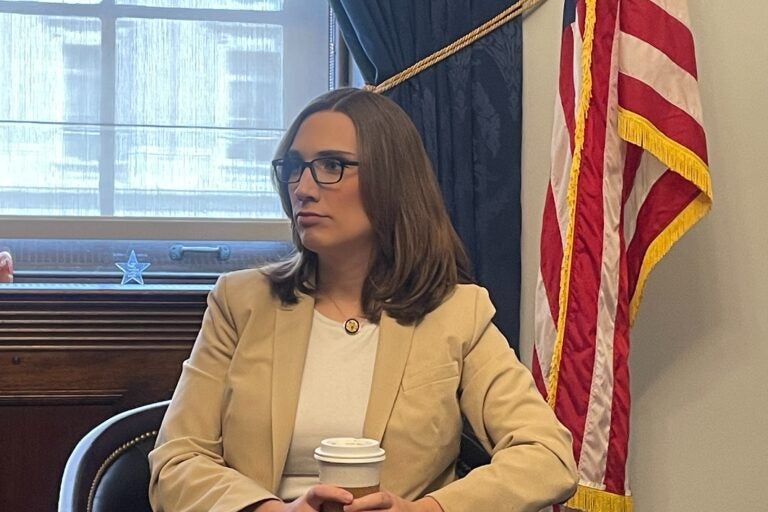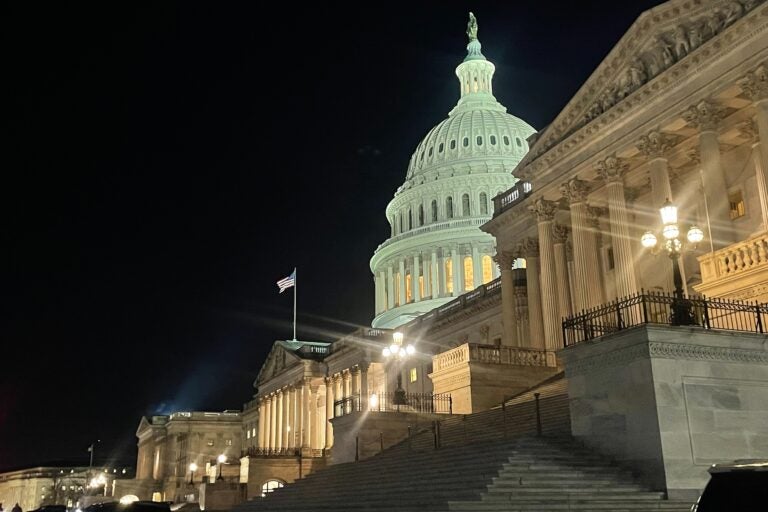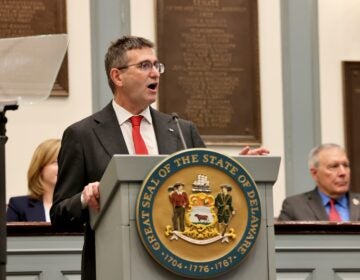‘Worse than many imagined’: Sarah McBride, Delaware’s pioneer in Congress, toiling to thwart Trump
Her gender identity is central to her story but doesn’t define how the diligent, curious U.S. representative works to improve constituents’ lives.
Listen 6:26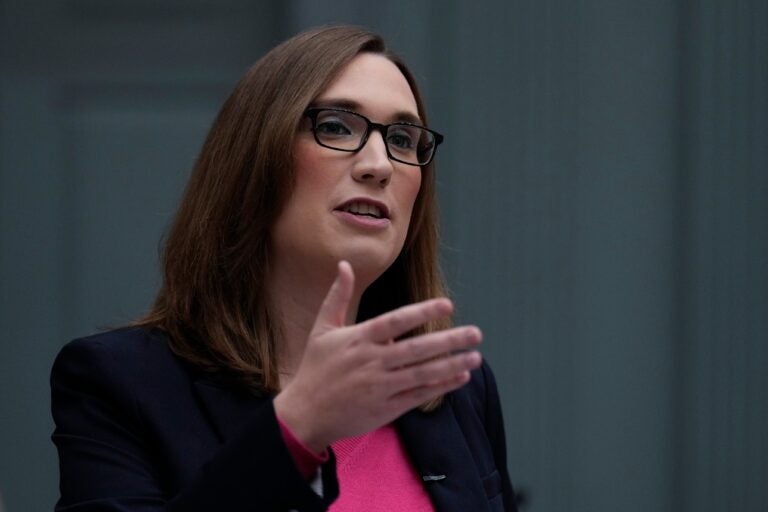
U.S. Rep. Sarah McBride, D-Del., gives her farewell speech on the Senate floor during a Special Session, her last day as a Delaware state senator, at the Delaware Legislative Hall in Dover, Del., Monday, Dec. 16, 2024. (AP Photo/Carolyn Kaster)
From Philly and the Pa. suburbs to South Jersey and Delaware, what would you like WHYY News to cover? Let us know!
This story was supported by a statehouse coverage grant from the Corporation for Public Broadcasting.
Sarah McBride passes through the security checkpoint at the Longworth House Office Building, and within seconds Dr. Rhea Debussy rushes to greet her.
“So good to see you,” they both say, almost in unison after their chance encounter this month in Washington.
Debussy and McBride had met briefly years ago in Ohio, where the doctor works for a nonprofit health system for LGBTQ+ patients.
The two women are also leaders in the transgender community, where McBride is an inspirational figure from Delaware who in January became the first transgender member of Congress.
“It’s huge to have a member of our community actually representing us but also her district so well in Congress and with such poise,” says Debussy, who does advocacy work on Capitol Hill.
They take a selfie, bid each other goodbye and McBride marches toward the elevator that will take her to her congressional office. But first she’s stopped by another fan and selfie seeker — Michael Grage, a Colorado school board member who once met McBride in Washington.
“I’m so starstruck,” Grage says.
McBride, the 34-year-old Wilmington Democrat elected in November as Delaware’s lone member of the U.S. House of Representatives, takes her celebrity status in stride.
“People are really warm and lovely and so nice,” McBride says.
Then she pushes open her heavy wooden office door.
It’s time to work.
The day was Feb. 4, a marathon that would be packed with meetings with constituents and advocates, strategy sessions about pending legislation, a couple votes on the House floor and more meetings well into the night.
McBride let a WHYY News reporter join her for the day, starting with a two-hour ride from Wilmington to Washington in her Chevrolet Equinox. “I find it meditative. It gives me time to think,” she says of the 110-mile drive.
Once at the Capitol complex, McBride provided rare, insider access to a member of Congress going about her business, even allowing a reporter to join what are usually private meetings.
What immediately became crystal clear is that McBride is a diligent, curious policy wonk who takes time to explore and understand the nuances of issues and legislation, even delving into minutiae she deems vital to know. That’s the same approach she took during four years in the Delaware state Senate, where a colleague observed that anyone who discounts McBride as a “show pony” soon learns she’s an effective and persistent “work horse.”
And while McBride’s gender identity is central to her personal story and unique political journey — and inspired ire and retaliation from Republican House colleagues before she even took office — it doesn’t and won’t define her approach to representing her state and nation.
She set that tone in November, two weeks after being elected, when GOP Reps. Nancy Mace of South Carolina and Marjorie Taylor Greene of Florida called McBride a man. Speaker Mike Johnson compounded the insult by barring her from using women’s restrooms and locker rooms in Capitol and House buildings. “Women deserve women’s only space,” Johnson said.
Rather than lash out, McBride remained true to her philosophy of practicing what she calls the “politics of grace.” McBride responded by saying she disagreed but would follow the rule. “I didn’t come here to fight about bathrooms,” she said.
Despite the venom sometimes directed her way, McBride says no one on Capitol Hill has been hostile to her in person, including Mace when they crossed paths in the hallway. The two didn’t talk, but there was no scene.
“Every once in a while you can sort of tell from a look that maybe someone might be thinking” of her gender identity, McBride says. “But look, most people are kind people. Most people are like, ‘Are you here to do the job ethically and responsibly?’”
McBride emphasized that she didn’t seek a seat in Congress to be a trailblazer or grandstand in the media, but to improve people’s lives. That mission deserves her full attention, she says, promising that she’ll fight for people’s rights but won’t get distracted by petty, inconsequential issues.
“If you’re in this job to get attention, for attention’s sake, you can find another line of work,” McBride says. “But the role of a member of Congress is to be a serious person who will work with anyone to deliver for their constituents, but also will of course stand up to anyone who wants to hurt their constituents. And that’s fundamentally what I see every day being about in Washington.”
‘Real concern across the government, civil society, nonprofits’
Telephones are ringing off the hook at 10:30 a.m. when McBride enters her four-room office suite, where three aides in the front room answer a barrage of calls.
They’ve been fielding about 500 a day since President Donald Trump began his second term by moving to slash the size of the federal government and revamp U.S. domestic and foreign policy.
That’s a heavy burden for any Democrat, with the party now in the minority in both the U.S. House and Senate, let alone for the sixth-youngest member of Congress as she settles into her new job.
But McBride, a staunch supporter of former President Joe Biden, her hometown mentor and friend, says she relishes the fight to uphold the Constitution and protect marginalized populations from “the cruelty” of Trump’s approach to governing.
She’s talking about Trump’s initial blitz of executive orders, actions and threats since succeeding Biden.
Trump had only been back in office for two weeks. But the president had already attempted sweeping funding freezes, offered buyouts to more than 2 million federal workers, suggested layoffs were imminent, eliminated diversity, equity and inclusion programs, halted birthright citizenship, started mass deportation of undocumented immigrants and pardoned more than 1,500 people convicted in the Jan. 6 insurrection at the Capitol, where McBride now works.
“There’s real concern across the government, across civil society, across nonprofits, across health care providers. The fear is widespread,” McBride says.
“There’s an effort by this administration to flood the zone” with what she believes are outrageous or unconstitutional actions. “And our focus has to [be preventing] the effort to gut the federal workforce and gut federal funding — to essentially dismantle, department by department, the federal government and more or less sell what remains for parts in order to line the pockets of uber-wealthy donors.”
McBride moves to the back room, where her top deputies work and monitor a wall-mounted television tuned to a Senate committee hearing on Robert F. Kennedy Jr.’s nomination as Trump’s health czar. In another room, two legislative aides track the dizzying volume of bills that cascade through Congress.
A hallway has a table and shelf with coffee, tea and snacks, and a small bathroom. Asked if she ever feels the urge to defy GOP detractors and use the public bathroom just 15 feet outside her office door, she laughs for a brief second, and in an uncharacteristically sharp tone, simply says, “No.”
Then there’s McBride’s own office, which has a bookshelf, couch, chairs and coffee table, but no desk.
“I took a desk out. I’m very techy,” she quips. “I don’t sit here and do emails. I sit here and have meetings. So why would I take up space in a relatively small office with a desk? And I also don’t want to sit behind it and talk to people.”
That’s what McBride did all through the day, sharing in the trepidation and fighting spirit of advocates who included leaders of the American Civil Liberties Union of Delaware, Nemours Children’s Health, Delaware School Boards Association, League of Conservation Voters, Special Olympics Delaware and National Federation of the Blind. She’s so busy there’s no time to venture from her third-floor office to the basement cafeteria to grab a cup of coffee.
During her session with the ACLU, Delaware director Mike Brickner says residents are concerned about abortion access, LGBTQ+ rights and “crackdowns on teaching American history, the true American history.”
Yet none of those fears, Brickner says, come close to the terror felt by undocumented immigrants and their families, especially ones with “mixed status” in Sussex County’s Latino community.
“Parents are saying, ‘We’re getting our kids U.S. passports because we know that we’re going to get rounded up and deported at some point and we want to make sure that our kids can come with us,’” Brickner says. “People are really just frightened. It’s a depressing time.”
Brickner also mentions the Trump administration’s suggestion that federal transportation money might be taken away from jurisdictions that don’t cooperate with deportation efforts.
McBride says such policies are typical of Trump’s hypocrisy.
“If you’re a right-wing [attorney general], you get to do whatever you want,” she says. “But if you are an inclusive state that wants to make sure you’re prioritizing law enforcement resources toward violent crime, you’re putting your funding at risk. It’s this perpetual phenomenon of seeking to punish political opponents and have their allies not held to the same standards.”
McBride tells Brickner his dismay has become a common theme in her meetings, that so many people are rattled by the speed, scope and disruptiveness of Trump’s moves. “It’s a challenging time, and to your point earlier, a really scary time for a lot of people in Delaware and across the country,” she says.
After the meeting, Brickner praises McBride.
“She provides a great example to many other trans and nonbinary people in the United States that there is no ceiling that you can’t break, that you are represented at some of the highest levels of government, and that you have a space in the decision-making process,” the ACLU leader says. “But I also believe Sarah is not just her gender identity, that she is a thoughtful and intelligent legislator and brings that to her work here in D.C.”
‘Miss Sarah is so transformative and really pretty inspirational’
Rep. McBride also sits down for a half-hour with Patrick Harker, head of the Philadelphia Federal Reserve Bank and former president of the University of Delaware.
While Harker’s remarks were off-limits for this story, during their chat McBride alludes to Trump’s demand, three days after his inauguration, that the Federal Reserve cut interest rates at its Jan. 28–29 meeting.
While the nation’s central bank ignored the president’s call, McBride says it’s vital that the 112-year-old Federal Reserve, created to be free of political interference, remains that way.
“It’s a precarious time and the independence of the Fed, of thoughtful apolitical monetary policy decisions, is a foundation of trust and stability in our economy,” McBride tells Harker. “And efforts to politicize it would undo a century of progress and really a pillar of our financial system.”
McBride also discusses the potential of cuts to Medicaid funding during a meeting with Dr. Kara Odom Walker and other leaders of Nemours, which runs the renowned Nemours Children’s Hospital in Wilmington’s outskirts. Walker previously headed Delaware’s Department of Health and Social Services.
After the meeting, Walker says cuts to Medicaid funding could prove devastating to health care for lower-income patients in Delaware, including many treated by Nemours at its hospital and clinics. Delaware spends about $3.2 billion annually on Medicaid, with well over half of that money coming from the federal treasury.
“I’m so concerned about the potential impacts on federal changes specifically to Medicaid and to children’s hospitals,” Walker says, noting that cuts could adversely impact not only blue states like Delaware, but red ones as well. “That could be changes in research, changes in service, changes in care.”
On another note, Dr. Walker says she’s delighted to see McBride in Congress, especially during this tumultuous time for federal programs.
“Miss Sarah is so transformative and really pretty inspirational,” Walker says. “She is giving us so many opportunities to elevate important issues for children, for families, for our region. And so having her ability to convey that to Congress is just so exciting.
“She’s so smart and articulate. If we can just have more storytellers and more champions like her, I think we would be in a different place.”
Poring over the details of pending legislation
At about 6 p.m., after the meetings conclude, McBride confers with legislative aides Jacob Glasser and Hatti Specter about upcoming bills.
First, they briefly discuss that evening’s two votes, both on noncontroversial bills likely to pass with near unanimity. One reauthorizes a grant program to help states eradicate nutria, an invasive rodent that damages marshland but isn’t a problem in Delaware.
Glasser jokes that he didn’t know about the nutria issue but says the measure should be passed.
McBride agrees to vote yes, but finds irony in the exercise.
“They’re going to reauthorize this grant program the Trump administration might not actually execute,” she says.
“Exactly,” Glasser replies.
They pivot to a substantial House bill, one that would permanently place street versions of the deadly opioid fentanyl as Schedule I controlled substances — drugs with a high risk of abuse and no accepted medical uses.
Schedule I drugs also carry the harshest sentences. For example, offenses involving at least 100 grams of what the bill calls “fentanyl-related substances (FRS)” would trigger a 10-year mandatory prison term.
Prescription fentanyl, which is used to treat severe pain, such as for advanced-stage cancer, is a Schedule II drug.
During a morning chat, Glasser says FRS has been Schedule I on a temporary basis since 2018, with plenty of Democratic support.
He says some Democrats have grumbled that Republicans left them out of the “drafting process” for the current version. “It’s by no means a perfect bill, but it’s definitely an improvement from our current state of affairs,” Glasser says.
Asked by WHYY News how she would vote, McBride says she has questions, such as whether someone would face the full criminal penalties if they didn’t know their drugs had street fentanyl, and how prosecutors would be instructed to handle cases.
“I believe we shouldn’t have haphazard drug and narcotics policy in the country, but we’re going to have a meeting to talk through the details,” she says.
At the evening meeting, Glasser points out that the bill addresses concerns of some Democrats by allowing researchers to study FRS in hopes of finding therapeutic uses, such as reversing overdoses.
Glasser also notes that many Democrats still oppose the measure, including Maryland Democrat Jamie Raskin, ranking member of the House Judiciary Committee. Raskin’s objections “are primarily focused on criminal justice” and mandatory minimums, Glasser says.
“It’s not perfect. I just think [Republicans] know that Democrats are going to have to vote for this stuff because everyone’s worried about fentanyl. So for those reasons we’re recommending a ‘yes’ vote,” he adds.
McBride seems satisfied with Glasser’s advice, adding, “The criminal part is the main part I’d like to wrap my mind about a little bit more, but the rest I get.”
Two days later, McBride voted for the measure, joining 97 of 215 Democrats and all but four of 218 Republicans.
Glasser also briefs her on what he called a bill “to ban a ban on fracking,” the contentious practice of injecting liquid at high pressure deep underground to extract oil or natural gas.
“Bans bans on fracking,” McBride repeats, not trying to disguise her sarcasm.
The Republican-led measure would prohibit the president “from declaring a moratorium” nationally unless authorized by Congress.
Glasser frames it as a GOP performance bill that has limited support from Democrats in Pennsylvania, Texas and some western states where fracking is prevalent. Environmental protection activists such as the Sierra Club “are pretty worked up about this one,” he tells McBride. “Essentially it’s just trying to give Republicans a win. They’re obviously not worried about a ban on fracking under a Trump presidency. They just wanted something to move on and talk about how they’re lowering energy prices this week.”
He asks McBride if she’s comfortable voting against it.
“Yeah,” she says.
That’s wht she did but as expected, that bill passed the House, mostly along partisan lines.
‘I asked for basically every report as it relates to 30 countries’
The skull session continues, with Glasser providing details about upcoming roundtable meetings on issues such as a Democratic session on how Trump’s funding freeze, if enacted, could affect Ukraine in its war with Russia. Other bipartisan meetings would focus on competition in the artificial intelligence field from China and other parts of Asia.
Those issues pique McBride’s interest, especially since she’s on the House Foreign Affairs and Science, Space and Technology committees.
They also prepare for her first science panel hearing, scheduled for the next day when McBride will speak for about two minutes.
McBride says she plans to highlight Delaware-based companies “that could be theoretically impacted by the federal funding freeze.”
She specifies the National Institute for Innovation in Manufacturing Biopharmaceuticals, a biopharmaceutical partnership based at the University of Delaware that she visited as a state senator.
The House newbie also asks Glasser about the mechanics of her allotted time.
“If you have extra time, you could say, ‘I yield back,’” he offers.
“But I likely won’t,” she jokes. “In fact, I will probably run out of time.”
Before they wrap, Glasser asks McBride if she needs any more research materials from the Congressional Research Service.
“I asked for basically every CRS report as it relates to 30 different countries,” she tells WHYY News. “I still haven’t had a chance to get through all of them.”
Yet McBride asks for another one, about NATO and Ukraine, adding that she’s gratified for the researchers.
“They are just brainiacs,” she says. “They have a smorgasbord of memos and then you can also request memos on issues if they don’t have it. But they probably will.”
Must ‘push back on the worst excesses of this administration’
Then her office speakers emit a long beep, signaling activity on the House floor. It’s nearly 7 p.m. — time to vote.
It’s an elevator ride and a long walk, past a string of Capitol Hill reporters lining the ornate hallways.
Nodding at a few scribes, McBride ponders the harrowing and tumultuous road ahead during her two-year term and beyond if she seeks and wins reelection in 2026.
“I can guarantee you that some of those meetings [today] included people of varying political perspectives,” McBride says. “It’s fair to say that for Delawareans who voted for this president and Delawareans who didn’t vote for this president, there’s fear across that political divide.
“It’s in many ways worse than many imagined, but I’m not shocked to be here in this environment. I always knew it would be a possibility. I’m not naive. Elections have consequences and Republicans have full control of the federal government.”
That doesn’t mean Democrats are powerless, she says, noting the fusillade of lawsuits seeking to block many Trump moves, and some preliminary court victories.
“As we’ve seen over the last several days,” she says, “when we focus our energies, when we keep the main thing, the main thing, when we elevate the tangible harm on everyday Americans that this administration’s policies will have, we’re able to exert a degree of pressure through the public and through the courts to push back on the worst excesses of this administration.”
She borrows a line from Mr. Rogers, the late public television icon who said when the news frightened him as a child, his mother urged him to look for the helpers.
“There’s a lot of scary stuff on the news right now, but every single day I get to see those helpers in Delaware or Delawareans visiting me in D.C.,” she says.
Reminded that she’s now one of America’s biggest helpers, McBride doesn’t miss a beat.
“I certainly try to be of help,” she says. “That’s why I ran. It’s why I’m here, and if you’re not interested in being a helper here, then as I said earlier today, you should find another line of work.”
Then the pioneering congresswoman says goodbye and strides alone, past sentries guarding the entrance to her latest stage, the chamber of the U.S. House of Representatives.

Get daily updates from WHYY News!
WHYY is your source for fact-based, in-depth journalism and information. As a nonprofit organization, we rely on financial support from readers like you. Please give today.



